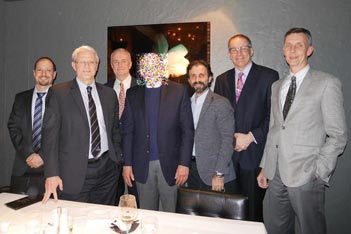The Skeptical Scalpel Presents
The Kergin Lecture

Frederick Gordon Kergin
|
Frederick Gordon Kergin
was born at Port Simpson in
British Columbia in 1907.
He began his studies at the
University of Toronto at age
sixteen and graduated from
the Biology and Medical
Sciences program in 1927.
In 1931, Kergin became a
Rhodes Scholar and spent
the next two years at Oxford
University earning a master’s degree in physiology
and anatomy, graduating with first-class honours.
In 1934, he began the four-year Gallie Course in
surgery at TGH and obtained the fellowship of the
Royal College of Surgeons of England in 1935 and
that of the Royal College of Physicians and Surgeons
of Canada in 1939. In 1937, he joined the surgical
staff of Toronto General Hospital and later took the
role as the Chair of the Department of Surgery of
the University of Toronto and Surgeon-in-Chief of
the Toronto General Hospital from 1957 to 1966.
He was a pioneer of thoracic surgery in Canada and
served as President of the American Association for
Thoracic Surgery. In 1966 he was appointed Associate
Dean in the Faculty of Medicine and was responsible
for developing a new undergraduate curriculum and
planning the conversion of Sunnybrook Hospital to a
teaching institution with full-time faculty. Dr. Kergin
chaired the editorial board of the Canadian Journal of
Surgery for many years and served as a trustee of the
R.S. McLaughlin Foundation.
His major contribution to the University was in
education, particularly in structuring the residency
programs such that an integrated program amongst
all fully affiliated hospitals was established. He died in
1974. Professor Kergin was a man with eclectic interests
that included teaching, research and university
administration, as well as many outside of medicine.
( http://livinghistory.med.utoronto.ca/people/frederick-gordon-kergin)
(http://surgery.utoronto.ca/events/kergin-lecturers.htm)
|

Kergin Lecture Dinner- from left to right: David Urbach, James Rutka, John
Semple, Skeptical Scalpel (anonymity protected), Tony Finelli, Martin Gargan,
& Tom Forbes
The Skeptical Scalpel is a deliberately anonymous
retired Chairman of Surgery and Residency Director
who practiced as a surgical hospitalist and acute care
surgeon prior to embarking on his current writing
career. He says that tweeting is “like writing headlines”.
His followers, including our recent guest lecturer Justin
Dimick, describe his blogs as filters that provide interesting
insight and knowledge without burdening the reader
with the excessive amount of material published in the
conventional surgical literature. Unofficially, he may be
the most read surgeon-blogger on the internet. His blog
averages over 1500 page views per day, and he has over
12,400 followers on Twitter.
“Skep”, as I will call him, told us that, when he did
critical care as part of his surgical practice, “there were
25 journals in critical care alone!”. He is enthused about
the effectiveness of social media for rapid information,
but warned us about the problem of disinformation
that can occur through the intervention of hackers. He
illustrated the dynamic responsiveness of the media with
a graph of the plunge in the Dow Jones industrial average,
when a hacker circulated a false story that a bomb
had exploded at the White House, injuring President
Obama. When this was broadcast as a fraudulent associated
press account, the Dow dramatically plunged, but
rapidly recovered when the correction was posted.
|
Skep has 400 followers in Toronto alone – 57% of his
followers are in the United States and 8% are in Canada,
the rest are scattered throughout the world.
“Academic journals are the most profitable obsolete
technology in history. Why do they stay alive? Elsevier,
with a 36% profit margin had an income of £878,323.
The reason it is so profitable is that we give the content
free of charge, reviewers work free of charge, associate
editors [like Skep himself] work for no salary.
Only Editors-in-Chief receive salaries for most journals.
Hindawi is an open access journal with an even larger
annual income. Layton Rikkers’article in the Annals
of Surgery in 2014 in volume 260(4):567-73 with
Drummond Rennie critiqued peer-review as an inconsistent
and slow process. “If it were a drug, the FDA would
take it off the market”. The British Medical Journal has
introduced rapid response as a post publication form of
peer review that is more timely than the tedious letter
to the editor technique. This is quite effective. The New
England Journal took five months to correct an error.
Bloggers, by contrast, can make corrections in days.
University College London is putting all faculty publications
online and quantifying the downloads, tweets,
retweets and tails to estimate their impact.
“There are predatory publications that will publish anything,
and accept fake articles by authors such as ‘IP Daily
and Hug and Kiss’. They have bogus editorial boards, and
hijack journal names.
The UofT’s Jocalyn Clark has written an article called
How to avoid predatory journals? (http://blogs.bmj.com/bmj/2015/01/19/jocalyn-clark-how-to-avoid-predatory-journals-a-five-point-plan/) In fact, many articles are
unread by anyone except the authors and peer-reviewers.”
Skep’s article on the value of CT scanning for appendicitis
got 30,000 blog reads, whereas he estimates that his entire
published output in books and journals probably reached
100 or so readers.” He states that he turned out a lot of
bad publications during his academic phase, only because
the residency review committee wanted his department to
publish. Pauline Chen of the New York Times is an active
surgical blogger. Kevin MD, an anonymous medical blogger,
accepts pretty much everything that is sent to him, if he
judges it to be worth broadcasting.”
The Wall Street Journal asked “Should doctors and
patients be Facebook friends?” Skep feels that Facebook
is useless and dangerous, as the dental students at
Dalhousie University learned to their lasting distress.
The College of Dentistry has threatened that they may
never get licensed because of their misogynistic statements
on the web. In contrast, there are good blogging
collaboratives on the web, particularly those devoted to
hernias and bariatrics. Using a slide of a surgical textbook
used as a doorstop, Skep asks “Why do we ask
surgeons on exams what is in the books? We should ask
them what they think.”
We now look at the net for movie reviews instead of
magazines. Residents and others ask Skep for medical
advice, though he is anonymous. He feels that the academic
space is being steadily replaced from the outside
by social media, analogous to the advent of laparoscopic
cholecystectomy, introduced by Eddy Joe Reddick and
Douglas Ole Olson outside the academic community.
In the question period, Skep was asked why he persists
in anonymity. He answered that he started blogging
when he was practicing and was concerned that patients
would be confused when they would google him by
name. His anonymous blog is now a brand, so he continues
it for fun.
M.M.
|